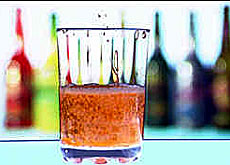Swiss teens hooked on “alcopops”

Cheap, sugary and potent - Swiss health experts are ringing alarm bells about the popularity of "alcopops" among teenage drinkers.
Switzerland, like many western countries, appears to have an unquenchable thirst for so-called designer drinks.
Concerns have been raised that the colourful concoctions are particularly damaging to young consumers, who are drinking to excess in ever-greater numbers.
The cleverly-marketed beverages – usually a mix of spirits and soft drinks or fruit juice – have struck a chord with young Swiss.
According to the Swiss federal alcohol board, market demand for “alcopops” is rising fast. Two years ago, producers sold some 2.5 million bottles in Switzerland. In 2001, that had burgeoned to 28 million bottles consumed.
This year, the board predicts sales will rise to more than 40 million bottles.
Taxes too low
While alcohol producers insist their products are only aimed at responsible adults, health officials are lobbying parliament for the introduction of heavier taxes to deter young consumers.
Helping fuel demand is the fact that Swiss supermarkets sell alcopops for less than SFr3 ($2) per bottle.
“It’s a joke. These alcohol pops are marketed at events that have a target market of young people,” says Richard Müller, director of the Swiss institute for the prevention of alcohol and drug problems – which is hosting an international conference in Bern this week to mark its 100th anniversary.
“The whole business is clearly aimed at the youth market, even though the sale of this alcohol to under 18s is illegal,” Müller told swissinfo.
Laws difficult to police
Recent studies show that Swiss liquor laws have done little to halt the popularity of under-age consumption.
Several years ago, the Swiss parliament increased the age limit on the sale of pre-mixed drinks from 16 to 18.
But according to a recent report by the Swiss daily newspaper, the “Tages-Anzeiger”, the legislative change has had little impact.
In one test, 392 children were sent out to buy alcohol in and around Zurich. At least half of those aged 13 and 14 succeeded, while among the 15-year-olds, almost two-thirds were sold alcohol.
Holger Schmid, a Lausanne-based health expert, says restaurants and bars are ill equipped to keep tabs on all their customers.
“The enforcement of these laws is very difficult,” Schmid told swissinfo.
“It’s almost impossible to ask everyone for their identity card and you need very good training for the service staff. And teenagers also get their older brother or friends to buy these drinks.”
Alcohol – the drug of choice
Alcohol consumption has been declining for more than 100 years in Switzerland.
A century ago, the Swiss drank 23 litres of pure alcohol per capita every year. Today, they annually consume around nine litres per head (or two bottles of wine per week), still one of the highest rates in the world.
But despite the trend, more and more young people are turning to alcohol, often with devastating results.
According to the Swiss institute for the prevention of alcohol and drug problems, around 12,000 children aged from 11 to 16 consume alcohol on a daily basis – a figure that is growing fast.
“The reasons for rising drunkenness is much more a matter of changing attitudes,” says Müller.
“To be drunk is to feel yourself in a different manner… and this seems to be important for young people.”
Motives for drunkenness
Schmid says governments need to look beyond higher taxes and tougher laws.
“If you ask young people why they drink alcohol to excess, they say, ‘because I just want to have fun’,” Schmid says.
“We live in a fun society, and we want to get away from our daily hassles, and this is a very effective way.
“But it’s also short term and you are creating long-term effects.”
Schmid believes policy-makers around the world – and not just in Switzerland – need to look at the motives for youth drinking
“It’s very important to prevent this search for drunkenness.”
Society’s blind spot
One of the problems confronting international delegates at the Bern conference is a general apathy about the problems linked to alcohol.
Even though other drugs – such as cannabis and heroin receive more press – alcohol remains one of Switzerland’s most expensive health issues.
Experts estimate the annual bill for alcohol-related problems is over SFr2.5 billion.
One delegate to the conference, Tim Stockwell – the head of Australia’s national drug research institute – says most people around the world believe alcohol problems are caused by a handful of drunks, while “the rest of us are fine”.
“But you look at the data, and it’s quite the opposite: Most of the harm that society has to deal with – and the costs and the human misery – is caused by people who don’t have a drinking problem. They’re not alcoholics and are drinking in a way that we all think is pretty much OK.
“As a society we have a huge mental blockage and denial about the seriousness. This is a drug that kills many more people than heroin, cannabis or amphetamines – all the things we get our knickers in a twist about politically.”
swissinfo, Jacob Greber
Demand for alcopops is soaring – 40 million bottles are expected to be sold this year compared with just 2.5 million in 2000.
Each Swiss drinks nine litres of pure alcohol a year – making them among the world’s biggest drinkers.
12,000 children between 11-16 years old drink alcohol daily.

In compliance with the JTI standards
More: SWI swissinfo.ch certified by the Journalism Trust Initiative










You can find an overview of ongoing debates with our journalists here . Please join us!
If you want to start a conversation about a topic raised in this article or want to report factual errors, email us at english@swissinfo.ch.